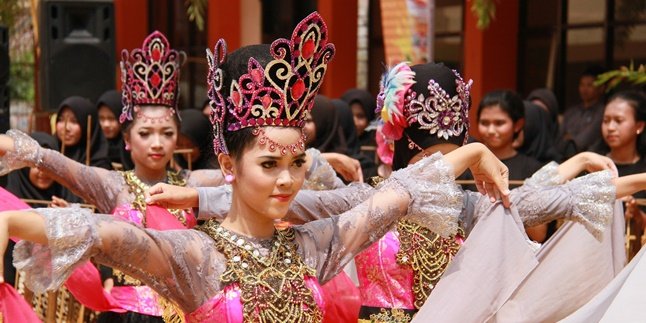Kapanlagi.com - There are many popular slang terms lately. The word 'sans' is one of them. Lately, this word can easily be found on social media through status updates, comments, or photo captions. In daily life as well, young people use this term a lot in their conversations. So, what is the actual meaning of 'sans'?
The word 'sans' may have become a popular term and widely used in daily life. However, in fact, this word is still unfamiliar to some people, especially those who are not active on social media. Even though it is important to keep up with popular language updates, so as not to be considered outdated. In addition, knowing the meaning of 'sans' and other popular vocabulary can also keep us away from misunderstandings.
If you are curious about the meaning of 'sans' and other popular slang terms, you don't need to worry anymore. Compiled from various sources, here is an explanation of the meaning of the word 'sans' and other popular slang terms currently.
1. Meaning of Sans

(credit: unsplash)
The term sans is classified as slang or popular words. Until now, the word sans has not been registered in the Indonesian Dictionary (KBBI). Therefore, to find out the meaning of sans, we cannot check it in the dictionary. We need to know where this slang word originated from.
The word sans is suspected to come from the word 'santai' (relaxed) which has undergone truncation in writing or reading. Thus, the word santai, which originally consists of six letters, is truncated into sans, leaving only four letters. This is reinforced by the use of the word sans in social media and daily life. Here are examples of the use of the word sans that have the same meaning as santai:
1. Ah, I don't really think about it, just go with sans, dude.
2. Not yet, just go with sans, we'll submit it tomorrow.
2. Other Slang Words that Also Mean Santai (Relaxed)

(credit: unsplash)
From the explanation of the meaning of sans above, we can understand that the slang term sans is another form of the word santai. However, it turns out that sans is not the only popular slang word today that has the meaning of santai. Besides the term sans, we can also find various other slang words that have the same meaning, which is santai. Here are some other slang words that also mean santai:
1) Santuy: derived from the word santai (relaxed) with the alteration of the last part, changing "-tai' to "-tuy".
2) Chill: derived from the English word that means 'santai'.
3) Calm: derived from the English word that means 'tenang' (calm), so it is considered the same as 'santai'.
4) Kalem: an original Indonesian word that is synonymous with tenang (calm) and santai (relaxed). In addition, kalem can also be interpreted as a play on the word calm in English.
5) Slow: derived from the English word that means 'lambat' (slow), so it is often considered the same as 'pelan-pelan' (slowly) or 'santai'.
6) Woles: derived from the word slow in English, spelled or read in reverse.
3. Other Slang Words Derived from Word Clippings

(credit: unsplash)
As mentioned earlier, the meaning of 'sans' is formed through the process of word clipping. Well, it turns out that 'sans' is not the only popular slang word in Indonesian that is formed through this process. There are still several other popular slang words that are also formed through word clipping. What are those words? Here are some of them.
1) Cans: Cantik (beautiful)
2) Gils: Gila (crazy)
3) Goks: Gokil (crazy)
4) Gans: Ganteng (handsome)
6) Ntaps: Mantap (awesome)
7) Yok: Ayo (let's go)
4. Other Popular Slang Words at the Moment

(credit: unsplash)
In addition to the meaning of 'sans', there are still many other slang words that are popular and need to be understood. It is quite important to know the meaning of each word to avoid misunderstandings. Here are some other popular slang terms at the moment.
1) Bucin: budak cinta (love slave)
2) Gaje: gak jelas (unclear)
3) Gercep: gerakan cepat (quick movement)
4) Halu: halusinasi (hallucination)
5) Japri: jalur pribadi atau jaringan pribadi (private line or personal network)
6) Komuk: kondisi muka (facial condition)
7) Mager: malas gerak (lazy to move)
8) Mantul: mantap betul (very cool)
9) Pansos: panjat sosial (social climber)
10) Ngab: bang (bro)
11) Sabi: bisa (can)
12) Takis: bikat (tricky)
13) Kuy: yuk (let's go)
14) Baper: bawa perasaan (overly emotional)
15) Caper: cari perhatian (attention seeker)
16) Lebay: berlebihan (exaggerated)
17) Sotoy: sok tahu (know-it-all)
18) Songong: sombong (arrogant)
19) Julid: iri atau berkomentar menyudutkan (jealous or making derogatory comments)
20) Unyu: lucu atau imut (cute)
21) Typo: salah ketik (typo)
22) Modus: modal dusta (lying strategy)
23) Gelay: geli atau gak like (ticklish or not likable)
24) Galau: resah atau perasaan bimbang (confused or conflicted)
25) Kepo: penasaran atau ingin tahu (curious or wanting to know)
Those are some explanations about the meaning of 'sans' which actually comes from the word 'santai' (relaxed). Hopefully, it is useful and can answer your curiosity!
(kpl/gen/psp)
Disclaimer: This translation from Bahasa Indonesia to English has been generated by Artificial Intelligence.
















